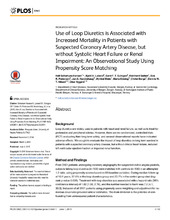| dc.description.abstract | Background Loop diuretics are widely used in patients with heart and renal failure, as well as to treat hypertension and peripheral edema. However, there are no randomized, controlled trials (RCT) evaluating their long term safety, and several observational reports have indicated adverse effects. We sought to evaluate the impact of loop diuretics on long term survival in patients with suspected coronary artery disease, but without clinical heart failure, reduced left ventricular ejection fraction or impaired renal function. Method and Findings From 3101 patients undergoing coronary angiography for suspected stable angina pectoris, subjects taking loop diuretics (n=109) were matched with controls (n=198) in an attempted 1:2 ratio, using propensity scores based on 59 baseline variables. During median follow-up of 10.1 years, 37.6% in the loop diuretics group and 23.7% in the control group died (log-rank p-value 0.005). Treatment with loop diuretics was associated with a hazard ratio (95% confidence interval) of 1.82 (1.20, 2.76), and the number needed to harm was 7.2 (4.1, 30.3). Inclusion of all 3101 patients using propensity score weighting and adjustment for numerous covariates provided similar estimates. The main limitation is the potential of confounding from unmeasured patient characteristics. Conclusions The use of loop diuretics in patients with suspected coronary artery disease, but without systolic heart failure or renal impairment, is associated with increased risk of all-cause mortality. Considering the lack of randomized controlled trials to evaluate long term safety of loop diuretics, our data suggest caution when prescribing these drugs to patients without a clear indication. | en_US |

